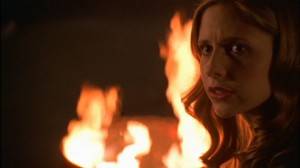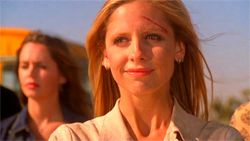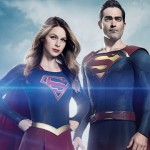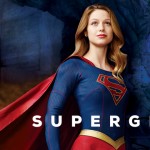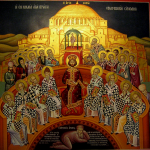I never thought there would come the day where I would disagree with Bishop Robert Barron on anything, but his latest article about the “You Go Girl” culture made me uneasy.
While I agree that parents in television, particularly dads, are usually portrayed as stupid at best and abusive at worst, I don’t agree with Bishop Robert Barron’s perspective that males are being made to appear weak in order to make women look stronger.
My friend Emily A. said
Men write these characters. In fact, I would claim that these are not elevations of women so much as parodies of both the male AND female characters.
These women aren’t smart, they are smart-asses. They are insufferably naggy women with impossible standards who don’t trust their spouse. And time and time again, the husband seems to prove them right.
The buffoon father is actually a stereotype perpetuated *by men* who want less responsibility.
Additionally, there is something to be said for stereotypes/archetypes: they exist because they *resonate* with people. Stereotypes are merely a compilation of common factors within a certain group. While they fail as a blanket statement, they are not altogether fictitious.
I think Father Barron is mixing up the concept of a caricature and a stereotype. They aren’t equivalent.
At the end of the day, though, we are all humans with failures, husband and wife alike. And we tolerate the worst on the bad days and sometimes have trouble recognizing and celebrating the best on good days. That’s human nature. It’s easier to laugh at those failings embodied in a character than dwell on them and get depressed.
I believe that when Bishop Robert Barron describes the “all conquering female,” he is thinking of the “Mary Sue.” The best definition I can give of a “Mary Sue” is one I got from video blogger Tommy Oliver (no relation to the Power Rangers): “A character so perfect that they are never challenged by the events of the narrative.” Bella Swan from Twilight is a perfect example of a Mary Sue because the worst problem she ever had to deal with, according to her perspective, is when Edward Cullen dumped her in New Moon. She deals with having a baby and taking down an evil band of vampires way too easily and she gets rewarded for essentially doing nothing of substance. She gets the boyfriend she wanted, the perfect baby, a lavish lifestyle, and immortality, but she never earned or overcame anything in order to get those things.
Rey from The Force Awakens was cited as an example of the “all conquering female,” but she’s not a good example of what Bishop Barron is thinking about. It’s true that Rey is often mistaken for a Mary Sue because of how she was able to use the Force so easily. However, it’s shown throughout the movie that she has her own challenges and weaknesses to overcome. She fights toe-to-toe with Kylo Ren and also has to overcome her fears of abandoning her life in Jakku to become a Jedi. The male characters in The Force Awakens stand on equal ground with Rey. Finn especially is considered a deuteragonist because the movie focuses just as much on his character growth as it does Rey’s.
I think Bishop Robert Barron is trying to advocate for better role models for men in the movies and TV shows we watch. I think that the potential for good role models expands beyond Sully and Deepwater Horizon. Captain America, while not perfect, is a role model for any man because he’s willing to do anything for the ones that he loves. The Flash has a few good male role models as well, including three characters who are fathers: Joe West, Henry Allen, and Harrison Wells from Earth 2. Barry Allen is also a good role model for young men because while he makes his share of mistakes, he does his best to learn from them in order to become a better person.
While I agree that women have been portrayed as weak in the past, the task of trying to make women strong and independent have led to a whole new kind of female stereotype: The Broken Bird. To quote the Nostalgia Critic:
“Women in the media for so long were always the emotional support, the damsels, the smiling pretty faces, so in the 90’s, there was a desperate need to change that. Oh, not by making them unpretty, we wouldn’t do that, but we suddenly made them cold, bitter, confrontational, and overly strong, to go out of their way to show that they’re not those old emotional stereotypes, and instead make way for new emotional stereotypes. For you see, in every 90’s film, the woman behind this strong independent wall that won’t let everybody in, is a sad little bunny rabbit that will eventually let down her defences and reveal a tragic backstory. So you see, she wasn’t a strong, confident worker just because she was a strong, confident worker. Deep down she just wants to be held like any other fragile woman. Oh, I don’t want to think! I just want to be loved!”
In other words, the “strong, independent woman” in a lot of movies and TV still needs all her problems solved by having a man in her life. To quote my friend Mary: “Closed off? Man will open you up. Insecure? Man will make you feel better. Lonely? Man got you covered.”
There’s one example in my life of a wonderful, strong, female heroine that doesn’t sacrifice her femininity in order to be badass. And the men in her life aren’t made weaker in order for her to be stronger. Ironically, she was created by someone who loved the atheist philosophers Sartre and Nietzsche.
I can’t imagine my life without Buffy the Vampire Slayer. The overall theme of the show is dealing with things that come with growing up and becoming an adult. While Buffy, may appear to be a good example of what Bishop Robert Barron is talking about, she is actually a great example of a well written strong female character. She is strong, but she has her moments of vulnerability. She defeats evil on a weekly basis, but she also has friends and family that she loves unconditionally. She’s a force for good, but she also makes some mistakes that she has to learn from. And no male character is made weaker so that she can be stronger. All of Buffy’s male enemies were formidable opponents. Giles, Buffy’s mentor and father figure, contributed his intellect and wisdom. Xander, in spite of his flaws, was a young man with a good heart and has saved the day a couple times. And Spike goes through a lot of changes that kept his character interesting and complex without sacrificing his own strength and charisma.
I think that strong, female characters can be created without the women needing a man or without a man becoming weak at her expense. Men and women, fictional or nonfictional, need to be treated as equals. To quote my friend Jillian:
Male characters, particularly father types, shoud not be dumbed down to make way for “strong independent female”? But should female characters be written to be the worst qualities of men in order to be strong/independent (unless it’s some kind of well fleshed out redemption arc)? Heck no. Is it possible to have a realistic strong female character alongside a realistic non-dumbed-down male character? Yes, and there are a plethora of examples. Should we stop fighting for fair treatment of and well written female characters in movies/comics/tv because some male characters are written poorly? No, because the former does not cause the latter.
Tl;dr: Strong female characters are not the cause of the bumbling dad/emasculated male character.

